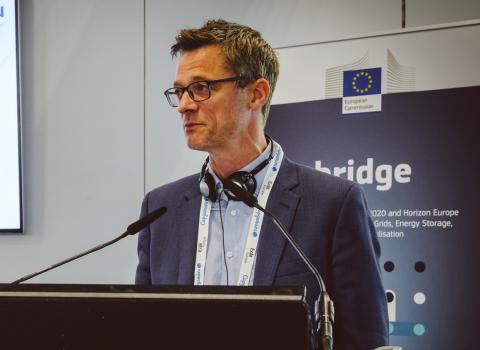Croatia is building a broad community of artificial intelligence innovators, start-ups, and early adopters that it hopes will give it an edge as AI becomes as common as the internet

Croatia’s artificial intelligence (AI) ecosystem is booming, and those involved are already preparing for the next phase, in which AI becomes as ubiquitous as the internet.
“We missed, and most of Europe missed, the internet wave 30 years ago,” said Mislav Malenica, president of the Croatian Artificial Intelligence Association (CroAI). “We watched from the side-lines, and in the end, we are all consumers. In Croatia, there is a feeling that AI is a new chance, and this time we should take it.”
Željko Krizmanić, coordinator of the specialist Bird Incubator in Zagreb, agrees. “Now you can say we are an AI incubator, but in five years time there won’t be start-ups who do not have an AI component in their business model.”
The sector’s strategy is to help this process along, building a broad community that emphasises the users as well as the innovators in AI. “Start-ups spending time with start-ups doesn’t create value. You need the whole ecosystem,” said Malenica, who is also the founder and chief executive of AI start-up Mindsmiths.
CroAI is working to bring together early adopters, potential users, and policymakers as well as innovators and their supporters in incubators, accelerators and academia. “We want people to realise that it’s exciting to be part of this scene,” Malenica said. “You can be a part of it as an investor, an adviser, a founder, an employee, a first client, or whatever. And right now, in Croatia, things are happening.”
When CroAI put together its first landscape study in 2020 there were around 70 AI start-ups in the country, out of a total of 250 companies, universities and other organisations in the ecosystem. The third iteration of the landscape, published last October, registered 130 start-ups out of 431 organisations in total.
“For a country with a population of 3.8 million, that’s huge,” said Martina Silov, executive director of CroAI. “And when you look at the number of venture capital funds in Croatia, the number of incubators, accelerators and so on, its much bigger than it used to be five years ago.”
Material effect
One driver of this growth is a general uplift Croatia is experiencing from having gained two unicorns (start-ups valued at more than $1 billion) in messaging company Infobip and electric carmaker Rimac Automobili. That has had a material effect on how Croatian start-ups are perceived, for instance when it comes to raising international investment.
“If you have a population of just 3.8 million people and two unicorns, then you can see that something is happening here,” said Krizmanić. “Coming from Croatia is no longer a disadvantage, and it is slowly turning into an advantage.”
The unicorns also set a useful example in a country with a limited tradition of entrepreneurship. “Having companies from Croatia that are reaching this stage creates proof that it is possible,” said Malenica. “You can feel the enthusiasm, and now its about giving that a little bit of structure.”
The perception of a rising wave of AI companies in Croatia was one of the reasons data analytics company Poslovna inteligencija decided to set up the Bird incubator. Operating since 2021, it has selected its start-ups with an eye to the coming ubiquity of AI. “They don’t have to be AI companies, but we ask that they develop an AI component,” Krizmanić said. “They can be in agriculture or food, for example, but they come to us because they want to enhance their product with AI capabilities.”
The incubator has an international outlook, with companies able to participate remotely as well as take space in Zagreb. Alumni have come from as far away as India, the US and the UK, as well as closer to home in the region. Companies join any time, and are matched with mentors who can address their particular AI or business development needs. The incubator helps connect start-ups with infrastructure and tech vendors, with investors, and with companies happy to collaborate on proof of concept and product testing.
Paid pilot
This ability to connect with first users is one of the assets in Croatia’s AI ecosystem, and is recognised with the inclusion of early adopters in CroAI’ s landscape study. “You cannot start a start-up in a country where you cannot find a first client,” Malenica said. “Croatia is small enough, and has a certain amount flexibility, so you can usually test even very new technology.”
This was the experience of Matija Nakić, co-founder and chief executive of Farseer. “It’s a small market, so it is easier to get your first customers. People know people, they connect you with somebody, and suddenly you are doing a paid pilot for a huge Croatian company. And I’m not sure that happens so easily if you are in the US.”
Created in 2019, Farseer has developed a software-as-a-service (SAAS) platform for financial modelling, planning and analytics. Within it is a machine learning model for time series forecasting. “The AI is a small part of the product, but nonetheless a very valuable part of the product, because it helps people automate almost 90% of their planning.”
With a product that solves a problem for big companies, it was an advantage to find corporate users willing to try it out. “We went straight into really difficult problems and huge datasets, but then that is why we developed this system, to deal with data heavy models,” she said. “It’s not the standard path of starting small and developing gradually, but it was really good for the development of the product and the entire team.”
Talent is both a strength in Croatia and a challenge. “There are a lot of innovative and talented people in the region, but the pool isn’t big enough to satisfy the needs of the market,” said Krizmanić. This can be particularly hard on start-ups at the beginning of their journey. “It’s fine if the founder team has technical capabilities, or is strong in AI, but if you want to expand the team, then it is a war for talent out there, not just among start-ups but among big companies.”
Tempting young talent with stock options is not so easy in Croatia. “If you are in Estonia or the UK, then the government has taken care of that and it is quite a simple process, but if you are in Croatia then it can be quite difficult to give employees part of the equity of the company. You don’t have regulations to ease the process,” Krizmanić said.
Nakić thinks that the AI sector may be at an advantage when it comes to attracting scarce talent. “The best engineers want to solve difficult problems, and that’s what we offer. So, for us it is a little bit easier to find good engineers than it is for a company that does a simple mobile app,” she said.
She also targets engineers who are recent graduates or still studying. “Young people are completely fresh, open-minded and unburdened, and I think that’s really good for the product.”
And while competition for talent in Croatia stiff, it is still not as bad as it is in the US, where salary expectations are high and retention low. “Here, if you are investing in your employees, and they are growing and learning, you can actually expect to get a lot more value back,” said Malenica. “And there is a lot of untapped potential here that I plan to use.”
Where Croatia falls down is business skills. “We have great engineering schools and phenomenal engineers, and we have had that for decades,” Nakić said. “But there is a lack of knowledge of how to commercialise innovation, and of marketing and sales experience.”
For this reason, she expects Farseer will set up sales and marketing teams in the US and other foreign markets as it scales, even if product development is likely to remain in Croatia. “It’s very difficult to find experienced SAAS professionals in marketing and sales here.”
Data and regulation
A further challenge for AI start-ups is finding data to train their models. “If you are a small start-up, usually you don’t have this data and you need to start collecting it. And that can be hard even for a bigger company,” Krizmanić said.
Meeting the requirements of the EU’s General Data Protection Regulation will test most start-ups, but is not an insurmountable barrier. The forthcoming EU AI Act is something else. “That could become a huge obstacle, where companies would need to pay consultants hundreds of thousands of euros [to ensure they comply], and that will hold back development,” Krizmanić said.
For Malenica, the EU’s approach is putting the cart before the horse. “We cannot have regulation before innovation. Regulation is just to standardise best practices, and you cannot standardise something where we are still figuring out how it will work out in the end.”
Krizmanić agrees. “If you over-regulate the market in AI, and put too many bureaucratic obstacles on start-ups when they are trying to develop models, then it is going to be very hard for them to compete.”
Regulatory sandboxes for AI, in which companies can test their models against legal demands, would help in this respect, but the fear remains that it may all be too much for some Croatian start-ups. “The AI Act could make it very hard to innovate, and it is the start-ups who are doing the innovation,” Silov said. “And it becomes hard to innovate in Croatia, or in Europe as a whole, the start-ups will just move.”
Elsewhere in the Ecosystem…
- Lithuanian AI start-up Oxipit has closed a $4.9 million funding round for its autonomous medical imaging technology, which supports radiologists in their decision-making and independently produces patient reports where appropriate. The funding will support further development of the technology, and market expansion into new regions, particularly the UK. The round was led by Taiwania Capital, which has a $200 million fund dedicated to central and eastern Europe.
- Swiss space debris removal start-up ClearSpace has completed a €26.7 million series A financing round, which will help it ramp up operations ahead of a first clean-up mission for the European Space Agency, scheduled for 2026. The round was led by OTB Ventures, with backing from the European Investment Fund and Swisscom Ventures, along with the Luxembourg Future Fund and others. As part of the financing, ClearSpace will establish an operational presence in Luxembourg.
- Chalmers University of Technology is to build a copy of its quantum computer, as a testbed for Swedish companies with problems to solve, applications to develop, and components to test. The Swedish university’s Wallenberg Centre for Quantum Technology started building a computer in 2018, with performance currently standing at 25 quantum bits, but academic researchers are always so busy with the device that enterprise never gets a look in. The copy, along with a user support service, will be funded to the tune of 102 million kronor (€9.15 million) by the Knut and Alice Wallenberg Foundation.





 A unique international forum for public research organisations and companies to connect their external engagement with strategic interests around their R&D system.
A unique international forum for public research organisations and companies to connect their external engagement with strategic interests around their R&D system.